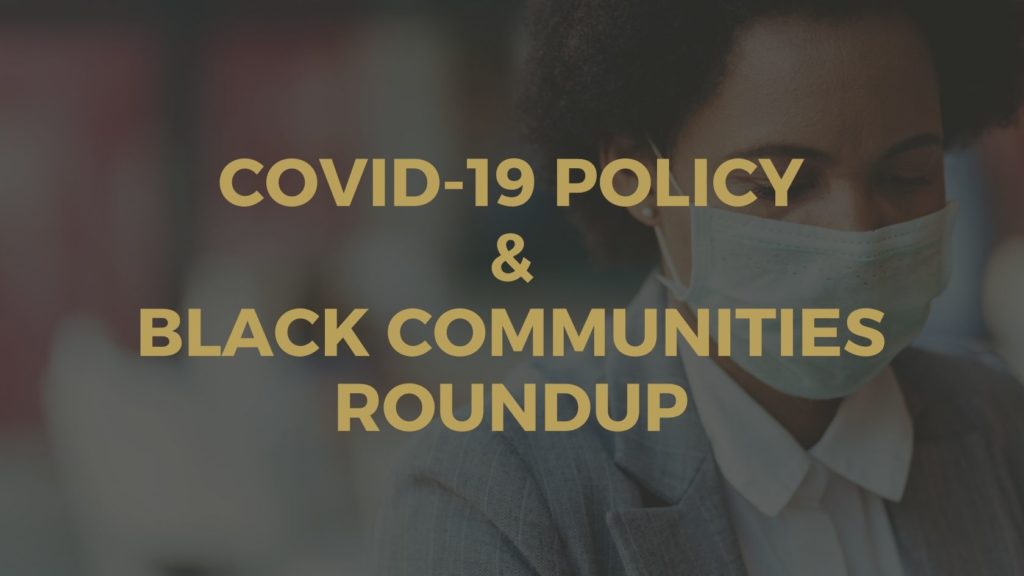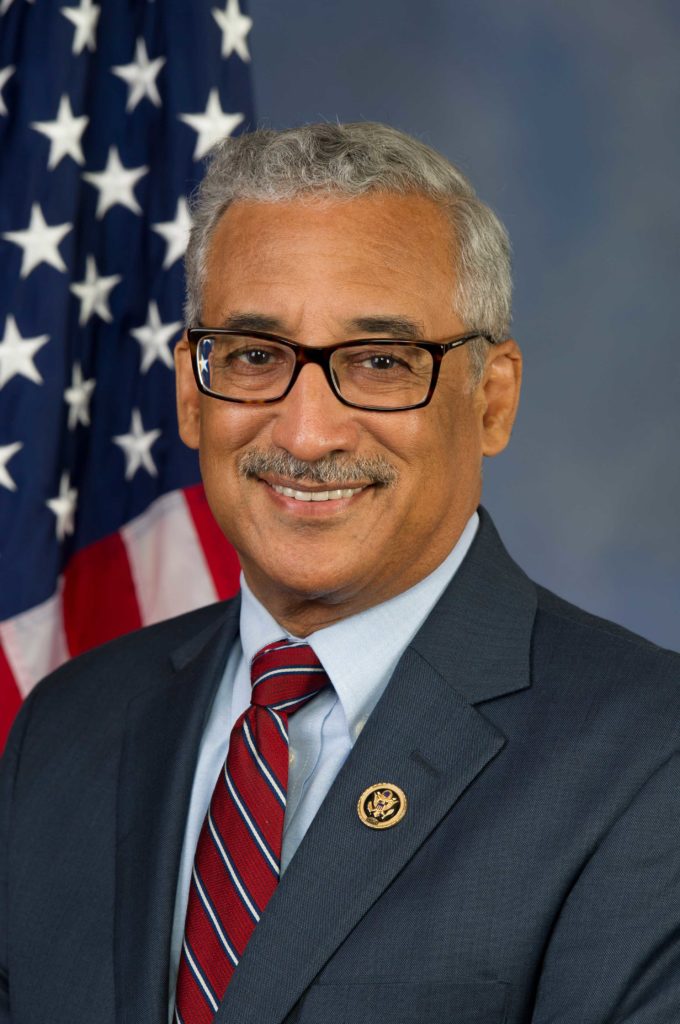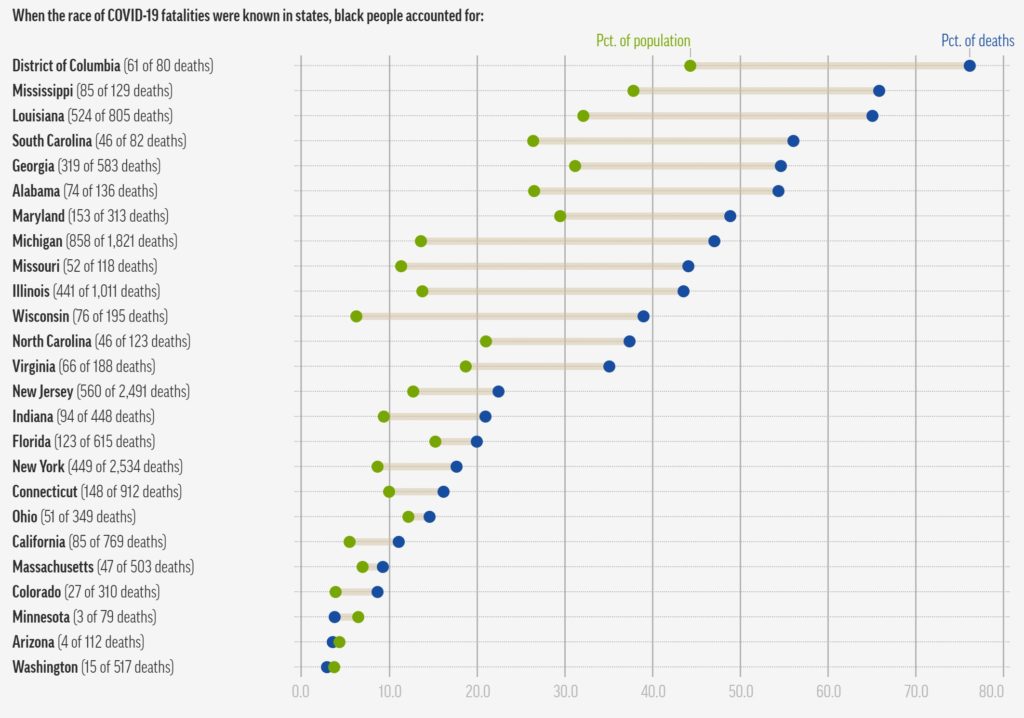Economic Policy

Apr. 20 COVID-19 Policy & Black Communities Roundup
This roundup reviews recent COVID-19 policy developments that affect Black communities. Click here for our COVID-19 policy page, which is constantly updated.
Last week, Anthony Fauci met with the CBC, record unemployment claims continued, and the Joint Center hosted an online briefing on accessible vote-by-mail and safe in-person voting for Black communities with Stacey Abrams and top voting rights experts.
This week, Congress is negotiating and may pass an “interim” COVID-19 stimulus to supplement past efforts, and the Joint Center is hosting an online conference on education and workforce priorities for Black communities with Congressman Bobby Scott, former U.S. Secretary of Education John King, and other key leaders.
Details below.
Stay safe and informed,
– Spencer Overton, President
Interim COVID-19 Stimulus This Week,
Larger Bill Possible Later
Right now, Members of Congress and the Trump Administration continue to negotiate a $450 billion “interim” COVID-19 bill that could be passed this week. The new bill could provide additional funds for the Paycheck Protection Program for small businesses and nonprofits (the program ran out of funds last Thursday). House and Senate Democrats are pushing to direct some of the funds to minority-owned and rural businesses, and to add more for hospitals and enhanced COVID-19 testing capacity. The interim bill is smaller than the $2 trillion CARES Act signed in late March. For more, see the New York Times, CNN & Politico.
In addition, House and Senate Democrats are developing their policy priorities for a larger COVID-19 bill that could move in May or June. The May/June major bill could expand unemployment insurance and provide funds for state and local fiscal relief, increased Medicaid and SNAP benefits, accessible vote-by-mail and sanitary and uncrowded in-person voting, infrastructure (e.g., broadband to reduce the digital divide), and more.
In response to the high rate of Black Americans dying from the virus, the Congressional Black Caucus held a call with infectious disease expert Anthony Fauci last week to push for more COVID-19 care in Black communities (Washington Post). In reference to that meeting, Fauci stated at a press conference that resources need to get “where the vulnerable are” (NBC).
On Wednesday, the Joint Center will host a video conference with Congressman Bobby Scott (D-VA), Chairman of the U.S. House Committee on Education and Labor, to discuss education and workforce priorities for Black communities in future stimulus legislation.

Respondents will include:
- The Education Trust President & CEO and 10th U.S. Secretary of Education John B. King Jr.
- National Urban League Senior Vice President Clint Odom
- National Education Association Vice President Becky Pringle
- National Black Worker Center Project Executive Director Tanya Wallace-Gobern

Economic Studies & COVID-19
Last week 5.2 million workers filed for unemployment in a single week (CNN), bringing the total number of filings near 22 million in the past four weeks. This was more than five times worse than the worst 4-week stretch of the Great Recession.
McKinsey released a new COVID-19 report that shows that Black workers are over-represented in the “essential positions” that have close contact with the public and low wages/few benefits—like nursing assistants, medical assistants, cooks & restaurant workers, and food preparation supervisors and servers. The Center for Economic and Policy Research and CNN also report that Black workers are overrepresented in grocery stores, convenience stores, drug stores, transportation, trucking, warehouses, the postal service, in health care, and at places like Amazon (26.5% of workers) and Walmart (21% of workers).
The McKinsey report also shows the impact of COVID-19 on Black communities will likely extend beyond high mortality rates to high unemployment and bankruptcy rates, as another 39% of Black workers that are vulnerable to furloughs, layoffs, or being rendered unproductive during periods of high physical distancing (5 points higher than whites and 7 points higher than Asian Americans). The Center for American Progress has a brief on occupational segregation with data showing that African Americans are overrepresented in many low-wage jobs vulnerable to layoffs during the pandemic, that Black households have less liquidity to respond to an emergency, and that Black workers are less likely to be able to telework (see also this Economic Policy Institute post estimating that only 19.7% of Black workers can telework).
A New York Times COVID-19 survey conducted between April 6-12 shows that of Black respondents, 49% have had their hours cut or income reduced due to the coronavirus (higher than other groups), and only 30% are able to work from home during the coronavirus outbreak (lower than any other group).
Civil rights activists, financial planners, others opine in The Atlanta Voice as to whether Black business owners will get their fair share of stimulus money.
House Financial Services Committee Chair Maxine Waters (D-CA) sent a letter to Federal Reserve Board Chair Jerome Powell urging him to “address concerns regarding the implementation of programs and facilities authorized by the CARES Act,” including provisions to support small business.
Political Studies & COVID-19
Last Wednesday, the Joint Center hosted an online briefing on accessible vote-by-mail and safe in-person voting for Black communities.
The session explored safeguards to ensure an accessible vote-by-mail system that does not dilute Black votes (e.g., prepaid postage, a postmark deadline of Election Day, the ability for third parties to collect and return sealed ballots, and quick notification of and ability to remedy any signature matching issues—see this Brennan Center brief showing vote-by-mail racial disparities without these safeguards). Participants also discussed the need to maintain sanitized and uncrowded in-person polling places for those who choose not to vote-by-mail.
Participants included:
- Fair Fight Founder Stacey Abrams
- Michigan Secretary of State Jocelyn Benson
- Black Voters Matter Fund Co-Founder LaTosha Brown
- Lawyers’ Committee President Kristen Clarke
- Leadership Conference President Vanita Gupta
- NAACP LDF President Sherrilyn Ifill
- Joint Center President Spencer Overton
The session was organized in partnership with the Leadership Conference on Civil and Human Rights and the NAACP LDF.
Watch it below, and read our summary on the event here:
Legislators continue to rally for improved voting options and conditions amid COVID-19 concerns. Former first lady Michelle Obama’s non-partisan organization publicly supported legislation sponsored by U.S. Senators Ron Wyden (D-OR) and Amy Klobuchar (D-MN) to expand early in-person voting and mail-in voting in response to the COVID-19 pandemic (CNN).
U.S. Senator Kamala Harris (D-CA) introduced legislation Thursday to authorize $5 billion in spending to improve voting options (The Hill). Congresswomen Marcia Fudge (D-OH) and Terri Sewell (D-AL) spoke to ESSENCE about the steps the Congressional Black Caucus is taking to help protect voters ahead of the 2020 elections. U.S. Rep. Alcee Hastings (D-FL) is advocating for more funding for the U.S. postal service in anticipation of an influx of mail-in ballots (Florida Daily).
Amid Georgia’s record-breaking request for absentee ballots (AJC) for the state’s June 9 primary, activists caution against mail-in ballots and identify other challenges that may pertain specifically to Black voters nationally. Allison Riggs of the Southern Coalition for Social Justice points out that Black voters tend to prefer in-person voting because of historical trauma during the Jim Crow era (Georgia Recorder). Diallo Brooks of People for the American Way, Rashad Robinson of Color of Change PAC, The Raben Group and the Lawyers’ Committee for Civil Rights, and All Voting is Local in Ohio all explored remedies to protect the Black vote in upcoming elections.
COVID-19 and the Digital Divide
As more states release racial demographic information (29 states so far according to The Atlantic), newly released studies show that 31% of Black adults are very concerned about getting COVID-19 compared to 18% of white adults (Pew Research Study conducted April 7 – April 12, 2020). See this Associated Press chart of 24 states and the District of Columbia showing the disproportionate effect on Black communities in each jurisdiction.

Source: Associated Press
U.S. Rep. Alexandria Ocasio-Cortez (D-NY) (The Daily), U.S. Rep Kamala Harris (D-CA) (Elle), and several local mayors and governors (Politico) continued to highlight the systemic racial divide that has led to the disproportionate mortality rate of Black people. Dr. Ibram Kendi of American University argues that Americans should “recognize how racism distinguishes Black poverty from white poverty, and makes black poverty more vulnerable to a lethal contagion” (The Atlantic). Scholars and local lawmakers expressed concerns about police harassing Black men for wearing a face mask, as recommended by the CDC (New York Times).
Organizing and Town Halls
Upcoming events include sessions on “COVID and the Class of 2020 – Black Students’ Transitions to College and Work” (New America Indianapolis, Apr. 21) and “Under the Blacklight Part Five” (African American Policy Forum, Apr. 22) on ways to protect the most vulnerable populations).
Last week, virtual webinars focusing on the impact of COVID-19 on the Black community were held by Governance Studies at Brookings, the NAACP in conjunction with BET, the Congressional Black Caucus, Third Way Michigan, and New America Indianapolis.

